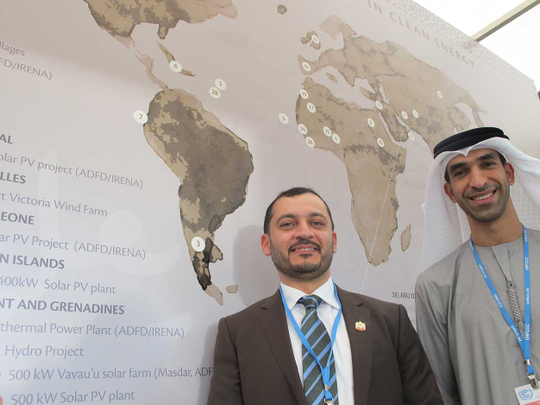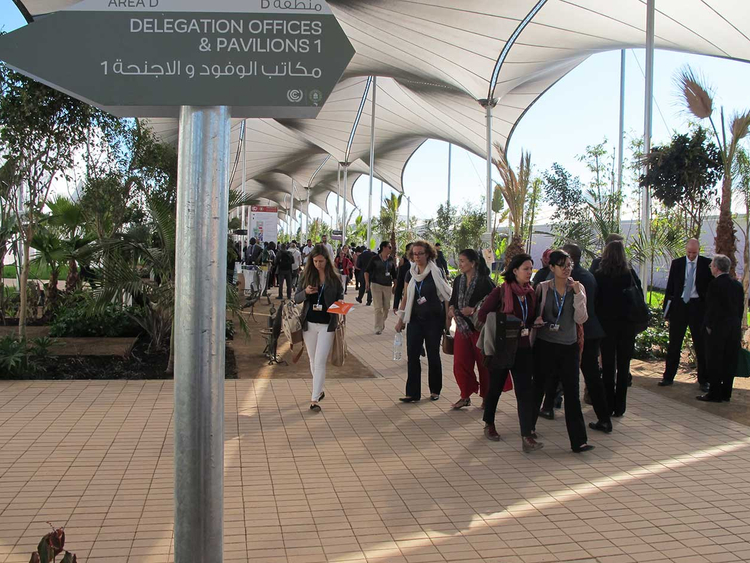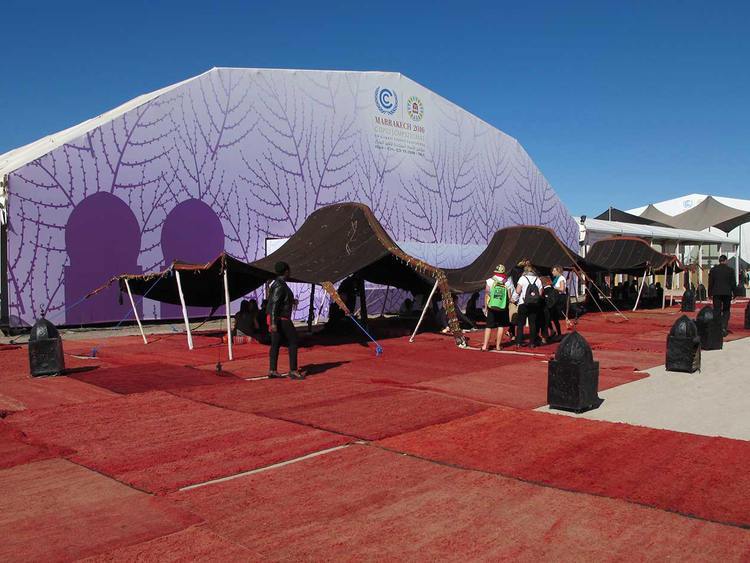
Marrakech: Twenty thousand delegates from 196 countries are at the UN Climate Change Conference in Morocco with one thing in mind — to help the world's 7.3 billion citizens turn back global warming before the world reaches an irreparable tipping point of no return.
And here in the immense maze of the 22nd session of the Conference of Parties (COP22) to the UN Framework Convention on Climate Change (UNFCCC) in Marrakech, the United Arab Emirates is delivering on its promise to reduce fossil-fuel based electricity production over time starting with a 27 per cent renewable energy mix by 2021.
The ambitious target will slash domestic greenhouse gases, a goal it ratified as part of its commitment to the Paris Agreement in order to help hold global temperature increases to well below 2 degrees Celsius in the century ahead.
A high-level delegation that has grown to more than 200 UAE visitors to Marrakech is being led by Shaikh Mansour Bin Zayed Al Nahyan, Deputy Prime Minister and Minister of Presidential Affairs, who arrived at the conference on Monday.
Alarm bells being sounded by scientists and meterological experts at COP22 that if the warming trend is not reversed now, ecological abuse and neglect may foist upon the planet searing heat waves, rising sea levels, polar ice melts and food and water security crises.
Negotiators attending COP22 assert that human-instigated climate change has already arrived as evidenced by melting Greenland glaciers, shrinking polar ice caps and hotter months in 2016 than ever recorded in human history.
Thani Al Zeyoudi, UAE Minister of Climate Change and Environment, said the timetable is pressing for countries who are working in Marrakech to hammer out the first pages of a new binding rule book that by 2018 is expected to underpin the Paris Agreement for decades to come with a tangible work plan for all countries.
The UAE has already pledged in its commitment – known as a Nationally Determined Contribution (NDC) submitted in Paris by all countries – that “in the post-2020 period, the UAE will continue to expand its ambitious actions to limit emissions and improve resilience through economic diversification...”
For Al Zeyoudi, the pledge is just the beginning of a long list of initiatives under way to counteract domestic hydrocarbon production, two thirds of which is attributed to energy and water generation to meet the demands of a UAE population that has more than trebled to 9.3 million people since the mid-1990s.
In a desert country where 89.5 per cent of the population lives in cities and relies heavily on air conditioning to stay cool, the challenges facing UAE utilities striving to reduce supply and demand side energy are daunting.
The push is also on in the UAE to improve green building and efficiency standards, build more district cooling infrastructure and continue to support efficiency standards for appliances and lighting.
“If you look at the total global emissions around the world, they come from the power sector. Our focus is on the power sector, going from zero or less than one per cent in 2014 renewables to 27 per cent is a huge reduction,” Al Zeyoudi told Gulf News in an exclusive interview on site at COP22 Village in Marrakesh.
Al Zeyoudi said that the UAE, while agreeing to limit greenhouse gas production, has not yet set a hard emissions cap in its NDC because it has already committed to phasing in green energy production via renewables, which will help in phasing down carbon-emitting fossil fuels to power cities and industry in the country.
Practical projects
“At the end, what concerns us is the practical projects and implementing them on the ground. It's about action and ground projects, not only in the power sector, but also transportation and in the oil and gas technologies,” he said.
He noted that the presence of Sheikh Mansour bin Zayed leading climate talks for the UAE is a strong signal that the country is taking the issue seriously.
“Climate change is one of the priorities for the leaders,” Al Zeyoudi said.
Fahed Mohamed Al Hammadi, Director of Climate Change Department at the Ministry of Climate Change and Environment, is at the climate conference alongside nine UAE negotiators, including five from the ministry, two from Adnoc and two from Dubai Electricity and Water Authority (Dewa).
Also read:
UAE's plan to make the earth greener
$50m round for financing renewables
In an exclusive interview with Gulf News, Al Hammadi said the UAE's delegation presence at the climate conference is critical to show the country's “action on accelerating renewables”.
Visitors to the UAE Pavillion at COP22 Village, for example, are being greeted by a massive global map illustrating the nation's investments in renewable energy projects in 35 countries around the world.
“We need to show the world and other oil countries that we are not only relying on oil,” Al Hammadi said. “We are developing an historic climate change plan.”
The most recent 350kw solar power project announced by Abu Dhabi has just set “a new world record of 2.42 cents US per kilowatt hour,” Al Hammadi said, for low-cost energy that is less expensive than traditional fossil fuels used to power electricity generation and and water desalination plants.
The low cost will help drive more to use solar power for smarter financial results, he said, not just because its a greener mode of powering homes, offices of industry.
Al Hammadi also noted that Abu Dhabi launched earlier its three solar-powered desalination pilot plant operations in Ghantoot, results of which could show the world that desalination can be powered by renewable energy.
What is the Paris Agreement?
Marrakech: So what is the Paris Agreement and what are countries like the UAE expected to do?
According to the United Nations Framework Convention on Climate Change (UNFCCC), countries are expected to meet climate goals and their national interests at the same time.
“Additionally, the agreement aims to strengthen the ability of countries to deal with the impacts of climate change. To reach these ambitious goals, appropriate financial flows, a new technology framework and an enhanced capacity building framework will be put in place, thus supporting action by developing countries and the most vulnerable countries, in line with their own national objectives. The Agreement also provides for enhanced transparency of action and support through a more robust transparency framework,” says the UNFCCC.
“The Paris Agreement requires all Parties to put forward their best efforts through 'nationally determined contributions' (NDCs) and to strengthen these efforts in the years ahead. This includes requirements that all Parties report regularly on their emissions and on their implementation efforts. There will also be a global stocktake every five years to assess the collective progress towards achieving the purpose of the agreement and to inform further individual actions by Parties.”














